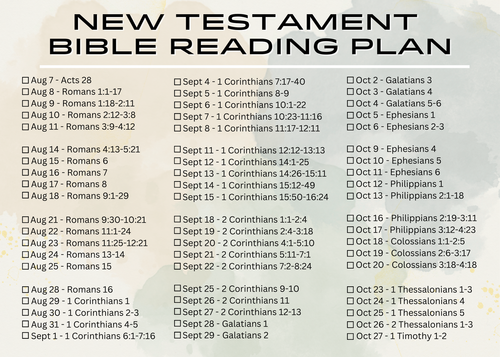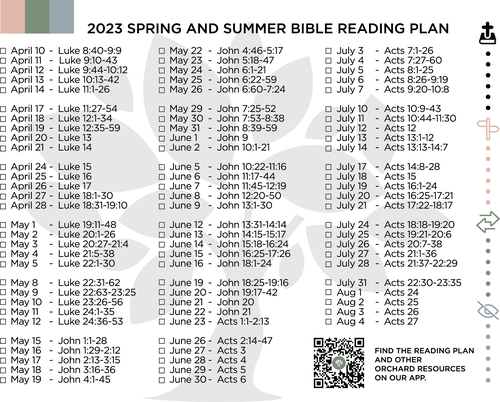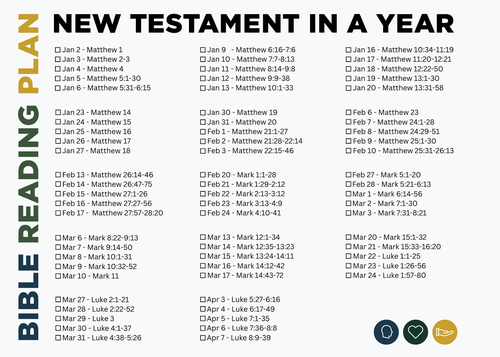The Unity Of The Spirit
Ephesians 4:1-32
Paul urges believers to live a life worthy of their calling. He emphasizes the importance of walking in humility, gentleness, and patience. Bearing with one another in love and maintaining the unity of the Spirit are key aspects of this calling. The bond of peace is what binds Christians together. Paul emphasizes the theological basis for unity through the repetition of "one." He starts with the church as the body of Christ and mentions the role of the Spirit. Believers are called to one hope, and Jesus is recognized as the one Lord. The faith they share is a common bond, as is their baptism. Ultimately, there is one God and Father of all, who is present in and rules over everything. The divine Trinity is central to Paul's discussion on unity.
He emphasizes Christ's role in bestowing unique gifts to believers for the benefit of the church. These gifts are not based on our works or merit but are graciously distributed by Christ. Paul cites Psalm 68:18 to support his claim, highlighting Christ as the conqueror who ascends to his heavenly throne and generously gives gifts to his followers. Christ's ascension signifies his exalted status, and its purpose is to fill all things as the divine Lord over the universe. Paul presents four types of individuals gifted by Christ to the church. Apostles are mentioned, followed by prophets, who are contemporary individuals speaking God's truth to the church. Evangelists are likely those entrusted with spreading the good news of peace through Christ by traveling. The final terms, "shepherds" or "pastors," and "teachers," are not distinct groups but overlapping roles. Pastors are a subset of teachers, as all pastors teach, but not all teachers are pastors.
Leaders are given by Christ to equip the saints. The context emphasizes gifts given to each individual for their work. Ministry is not limited to a select few who are paid, but rather, leaders are gifted by God to equip all the saints for service. The goal is to build up the body of Christ, focusing on qualitative spiritual growth and maturity, rather than merely numerical growth. Ultimately, Christ's gifting of leaders to the church aims to foster spiritual maturity in his body, the church.
First, believers should strive for unity in the faith and knowledge of the Son of God, aligning themselves with the apostolic teaching found in the Bible. Second, they should pursue maturity as a church, reaching the measure of the fullness of Christ. Paul warns against spiritual immaturity, likening it to being tossed and blown by false doctrine, human cunning, and deceitful schemes. Instead, believers are encouraged to speak the truth in love and grow into Christ. Christ, as the head, leads and nourishes the church for growth. The entire body, joined and held together, contributes to the growth through their gifts and love.
Although his readers are converted Gentiles in a Gentile context, Paul warns against walking "in the futility of their minds," emphasizing the meaningless nature of a life without the fear of God. Paul also describes the negative condition of Gentiles, whose understanding is darkened and who are alienated from the life of God. In contrast to unbelieving Gentiles, they have learned a different way through Christ. The Ephesians heard about Christ through the gospel proclamation and were taught about Him through apostolic teaching. They were instructed to put off their old self, be renewed in the spirit of their minds, and put on the new self. The new self is created in the likeness of God, characterized by righteousness and holiness. Paul urges his readers to live in accordance with this new self, displaying God's righteousness and holiness.
Paul introduces a series of moral exhortations that demonstrate the behavior of the "new self," created in the likeness of God. The command to "put away" falsehood should be understood as a directive to refrain from speaking lies. Instead, believers are encouraged to speak the truth to one another and to their neighbors, emphasizing individual responsibility.
These verses contain four commands: (1) be angry; (2) do not sin; (3) do not let anger linger; and (4) do not give opportunity. The first command, "be angry," is better understood as a call to appropriately express anger on certain occasions. Christians should hate sin and be indignant in the face of evil. The second command reminds us that anger can easily turn into sinful behavior. The third command advises dealing with anger promptly to prevent it from festering. The fourth command warns against giving the Devil an opportunity to exploit our unchecked anger.
Believers are not only called to do good with their actions but also with their words. They should avoid corrupt talk and instead speak words that edify and bring grace to those who hear. Speaking unkindly grieves the Holy Spirit, showing the connection between God's people and the Spirit. Paul exhorts his readers to put aside anger and avoid sins like bitterness, wrath, anger, clamor, slander, and malice. Instead, they are encouraged to be kind, tenderhearted, and forgiving, just as God in Christ forgave them.
He emphasizes Christ's role in bestowing unique gifts to believers for the benefit of the church. These gifts are not based on our works or merit but are graciously distributed by Christ. Paul cites Psalm 68:18 to support his claim, highlighting Christ as the conqueror who ascends to his heavenly throne and generously gives gifts to his followers. Christ's ascension signifies his exalted status, and its purpose is to fill all things as the divine Lord over the universe. Paul presents four types of individuals gifted by Christ to the church. Apostles are mentioned, followed by prophets, who are contemporary individuals speaking God's truth to the church. Evangelists are likely those entrusted with spreading the good news of peace through Christ by traveling. The final terms, "shepherds" or "pastors," and "teachers," are not distinct groups but overlapping roles. Pastors are a subset of teachers, as all pastors teach, but not all teachers are pastors.
Leaders are given by Christ to equip the saints. The context emphasizes gifts given to each individual for their work. Ministry is not limited to a select few who are paid, but rather, leaders are gifted by God to equip all the saints for service. The goal is to build up the body of Christ, focusing on qualitative spiritual growth and maturity, rather than merely numerical growth. Ultimately, Christ's gifting of leaders to the church aims to foster spiritual maturity in his body, the church.
First, believers should strive for unity in the faith and knowledge of the Son of God, aligning themselves with the apostolic teaching found in the Bible. Second, they should pursue maturity as a church, reaching the measure of the fullness of Christ. Paul warns against spiritual immaturity, likening it to being tossed and blown by false doctrine, human cunning, and deceitful schemes. Instead, believers are encouraged to speak the truth in love and grow into Christ. Christ, as the head, leads and nourishes the church for growth. The entire body, joined and held together, contributes to the growth through their gifts and love.
Although his readers are converted Gentiles in a Gentile context, Paul warns against walking "in the futility of their minds," emphasizing the meaningless nature of a life without the fear of God. Paul also describes the negative condition of Gentiles, whose understanding is darkened and who are alienated from the life of God. In contrast to unbelieving Gentiles, they have learned a different way through Christ. The Ephesians heard about Christ through the gospel proclamation and were taught about Him through apostolic teaching. They were instructed to put off their old self, be renewed in the spirit of their minds, and put on the new self. The new self is created in the likeness of God, characterized by righteousness and holiness. Paul urges his readers to live in accordance with this new self, displaying God's righteousness and holiness.
Paul introduces a series of moral exhortations that demonstrate the behavior of the "new self," created in the likeness of God. The command to "put away" falsehood should be understood as a directive to refrain from speaking lies. Instead, believers are encouraged to speak the truth to one another and to their neighbors, emphasizing individual responsibility.
These verses contain four commands: (1) be angry; (2) do not sin; (3) do not let anger linger; and (4) do not give opportunity. The first command, "be angry," is better understood as a call to appropriately express anger on certain occasions. Christians should hate sin and be indignant in the face of evil. The second command reminds us that anger can easily turn into sinful behavior. The third command advises dealing with anger promptly to prevent it from festering. The fourth command warns against giving the Devil an opportunity to exploit our unchecked anger.
Believers are not only called to do good with their actions but also with their words. They should avoid corrupt talk and instead speak words that edify and bring grace to those who hear. Speaking unkindly grieves the Holy Spirit, showing the connection between God's people and the Spirit. Paul exhorts his readers to put aside anger and avoid sins like bitterness, wrath, anger, clamor, slander, and malice. Instead, they are encouraged to be kind, tenderhearted, and forgiving, just as God in Christ forgave them.





Recent
Archive
2023
January
Happy New Year!He Will Save His People From Their SinsMy Beloved SonTemptation And MinistryThe SermonLeaving, Lying, Limits, Love, Largesse, and The Lord's PrayerTreasure, Anxiety, and JudgmentAstonishing AuthorityStorms, Demons, and HealingJesus Is CompassionateHis Eye Is On The SparrowSwords, Rewards, and MessengersThe Lord of the SabbathBlasphemy, Bad Trees, Signs, and FamilyStories, Sowers, and SoilsParables, Hidden Treasure, and RejectionFame, Food, Fear, Faith, and FringeReal Issues And The Power Of GodDying To Find LifeLike The SunChildren, Temptation, Sheep, And ForgivenessMarriage, Kids, And MoneyTo Serve And Give His Life
February
The ArrivalStories That StingQuestion TrapsHidden Motives And LamentThe End...?UnexpectedReady?Punishment, The Plot, And PerfumeTreachery, Passover, and The CupBetrayal, Injustice, And DenialThe Field Of Blood And The GovernorCrucifixion And DeathAll AuthorityMark—The Beginning Of The GospelHealing, Preaching, And The Forgiveness Of SinEating With Tax Collectors, Fasting, The Sabbath, And An Escape BoatThe Twelve, Blasphemy, Family, And A ParableParables And PowerA Different Kind Of StormPower Had Gone Out
March
Death, Hunger, And MiraclesCommandment Or TraditionDo You Not Yet Understand?The Christ And A Glimpse Of His GloryUnbelief, Confusion, And SinDivorce, Children, And PossessionsTo Give His Life As A RansomHosannaThe Rejected Stone, Taxes, And The Great CommandmentDestruction And The EndNo One Knows, An Anointing, And A Promise To BetrayPassover And GethsemaneThe Kiss, Arrest, And DenialPilate, Simon, And The CrucifixionDeath, Burial, Resurrection, And What\'s NextTheophilus And A Visit From GabrielMary And The MagnificatBenedictusThe Arrival And The ShepherdsSimeon, Anna, And The SpiritFruits Keeping With Repentance And BaptismThe Wilderness, Nazareth, And CapernaumSimon's Mother-In-Law, Fishing, A Leper, And Sins
April
Tax Collectors, Fasting, Sabbath Controversies, And The TwelveWhy Do You Call Me Lord, Lord?Jesus Marveled, A Raised Son, And QuestionsA Sinful Woman And A ParableObeying The Word, A Storm, And DemonsTwelve Years, Twelve Apostles, And SpeculationGreater, Costly, And GloryNot Getting It, The Cost, And AppointedWoes, Neighbors, And What Is NecessaryHelp Us Pray And A Divided Kingdom?Signs, Lights, And WoesHypocrisy, Fear, A Fool, And AnxietyParables, Division, And The TimesWarnings, A Daughter Of Abraham, And Jerusalem, JerusalemA Son Or An Ox, Parties, And DiscipleshipLost ThingsThe Dishonest Manager, The Law, And Anguish In This FlameMillstones And Mustard SeedsPersistent Prayer, Humility, A Childlike Faith, And The Rich RulerEverything That Is Written, A Blind Beggar, And A Wee Little Man
May
A Parable, A Colt, A Prophecy, And A CleansingAuthority, Wicked Tenants, And TaxesThings To Beware Of And WidowsDestruction, Persecution, The Son Of Man, And WatchingThe Plot, Betrayal, Lord's Supper, And Inappropriate BehaviorPrediction, Fulfillment, Agony, Betrayal, And DenialMistreated, Taken Before The Council, Pilate, Herod, And Delivered To Be CrucifiedCrucifixion, Death, And BurialHe Is Not HereDisbelieved For JoyIn The Beginning…The Lamb Of God And A WeddingZeal, What's Inside, And Born AgainHe Must Increase
Categories
no categories
Tags
no tags
